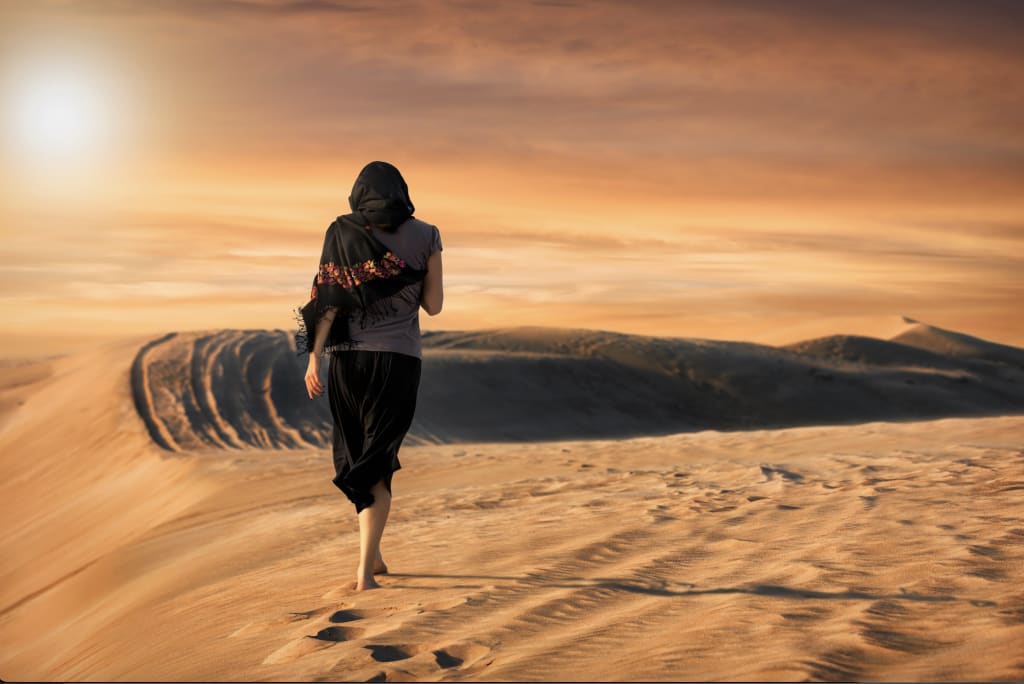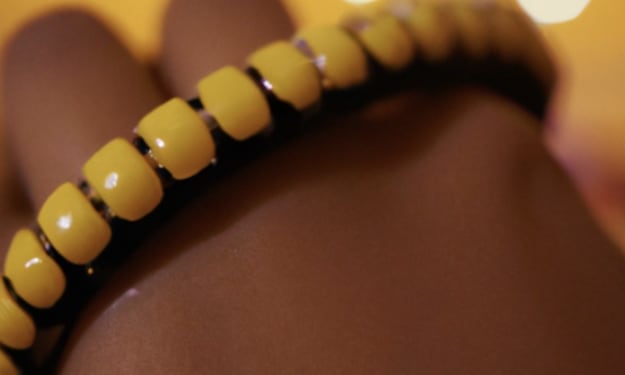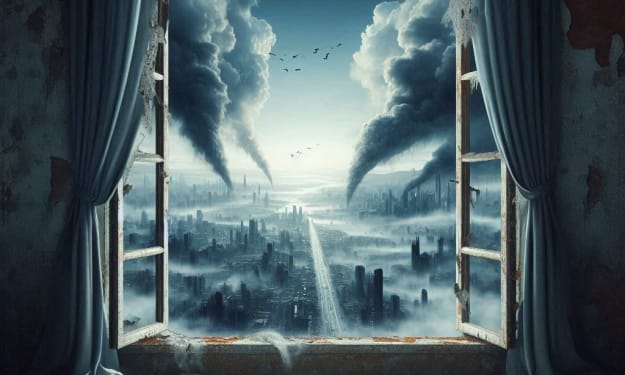
Overhead – a falcon; kestrel? No, a buzzard. Two: One each.
In her delirium (she was still drunk with that arid fatigue which the permanently dehydrated subsist in) she pitched her foot against a rock and gave a yelp of pain. The buzzards took no notice of the blood which oozed like water from a stone struck in anger.
She went on.
Her foot started throbbing. It was not the only part of her which throbbed. She closed her eyes and, with each pace, saw a vignette of her life pass:
One :
She was, perhaps, four, or five, the last year before . . . whatever it was that had happened. She never did understand. She was never told. She witnessed. She interpreted: There was running away from Tommy (he was It) and the sun was beating down on her neck. She would have to go faster to make it to the bike shed before he caught her.
“Mary! Help!” She turned her head as she ran. It was Susan. It was always Susan who was caught first.
To her everlasting shame she calculated that she couldn’t reach her in time to free her and get away herself. She could almost touch the shed. The sun was glinting off the front wheel of Robert’s new cycle. All she had to do was to touch it. She panted and reached out her arm.
Something lit up the sky.
Then, those who were left started running. Only it wasn’t a game.
Two :
She remembered the taste of saline in her mouth; of resisting the urge to gulp it down; of the weight of Henry’s hand on her wet head. Ecstasy and fear mingled. It had been the first time they went outside.
She lashed out with her left arm which must have winded him because the grip on her head was relinquished and she rushed upwards and out of the water, coughing with mild panic as she laughed.
“Some baptism!” shouted Kiro from the shore. “You’re one of us, now.”
Henry pressed his lips to hers. In the Shelter they had not been permitted to touch. Now, they were Citizens. Now, it was expected.
That night, she lost the last vestiges of innocence.
It was slow and serene – just as she had imagined it: Something of Arcadia in his kisses; something of Ares in his breath. Her fire was ignited. She radiated and quivered and felt whole.
Three :
This world was not meant to be. All agreed but none could mend it. In time, the mere anarchical instincts gave way to fragile and terrible order. The scorched earth no longer favoured the rich; the healthy were wealthy; the clever were gods. Mary belonged to both classes.
She had thrived on the inside. A quick study, she had devoured the books that had been rescued and kept them as insoluble companions in her heart. As she clutched her bowstring, she whispered poems to her prey; as she tracked a deer, she eulogised.
She never missed.
Only that first time – when she saw the colt nursing at its mother. She wasn’t hungry enough. There were still rations.
Four :
As imperceptibly as in her childhood game – when those who make it home become outnumbered by those who get Stuck – adolescence and peace departed and gave rise to responsibility, and confident despair.
Perhaps ten years had passed; perhaps twenty. There was communication, now. There were governments, again, and monarchs. Civilisation (or, at least, organisation).
It was certainly logical: if their race were to survive, the world must be peopled. She knew it from Shakespeare but it needed no poet to spell out. In the past decade (or was it, two?) she had seen no children. The playgrounds (those which weren’t skeletons) were silent. The sedge had withered (etc.,) No birds sang.
But there were gods in those days and, as from ancient runes, a spell was cast by a titan of bio-engineering: Aphrodite was assembled.
In other worlds, prophets had written of this – great tomes of cautionary tales in popular fiction: Huxley and Orwell; Atwood and Bradbury.
In Mary’s world, their ghoulish and fantastic fears were the simple, banal reality – the daughter of Necessity.
Like every other female Citizen, she reported to Aphrodite. Like every other woman, she wondered if it would hurt (it didn’t). She waited, expectantly, for her status to be announced: Infertile, Surrogate, or Eve? Most were designated the first class. She only knew one Surrogate and she had died at six months (they had missed something in the radiation levels).
So, when she heard the annunciation she did not believe it. The test was repeated (twice).
“M-m-my dear,” said the orderly, in a kind, quiet, Edinburgh accent: “You are to be congratulated!” He curled his mutilated lip and hobbled over to the door, and called out something.
It was all perfectly civil. They were all perfectly kind. She was special, after all. She embodied hope. She was the future.
But at the ceremony, when she gave up her bow and knelt before the Regent, she felt as though she were being imprisoned by a duty she had neither sought nor acceded to.
There were so few Eves it had been decided that they ought to be housed in the palace in Jerusalem. Mary was to be escorted by Imperial Guard and afforded every luxury. She would not, of course, be given carte blanche but there were several candidates whom she would be able to select as her preferred suitor this year.
The crossing was not rough, and Mary spent a good deal of time out on deck. The Imperial Guard eyed her with an equal air of reverence and avarice – it was as if she were a prize bull on its way to be slaughtered. She belonged to them and for them and, yet, she was not theirs. All undressed her with their steel gazes, peeking out of the helmets which masked their bleached skin. All, except one: Yoseph. He always averted his eyes when he saw her. He was a little shorter than the other guards, although he carried his broad shoulders high. His skin was olive, and he kept a stubbled beard. He spoke with a Middle Eastern accent and prefaced most of his discourse with an invocation to, “The God of all worlds – the Magnanimous, the Beautiful.”
Mary had not encountered love. She had read about it but dismissed as metaphor for something else; a plot device to permit two characters to wax lyrical about the moon or stars (or other celestial body) as signifying, or ordaining, their particular infatuation. It was the main source (as far as she could tell), of personal anguish. Its communication was not at all clear. Its purpose seemed to break more often than not.
It surprised her, therefore, when, on the eve of the great Festival – when she was to meet the suitors who had come from far and wide (one, it was rumoured, was coming from what used to be America) – she heard a commotion outside her rooms.
She had been attended to, since her arrival in Jerusalem last month, by a harem of ladies in waiting, who dressed her in the most opulent silks and lavished her with fruit and milk.
They had just retired for the night and Mary was taking her earrings out in front of the mirror. She liked to regard the room from its reflection. It showed a world untarnished by war, or the last two thousand years, in fact. It was as if a great enchantress had set a stony sleep on Jerusalem, so that she might have been Bathsheba or Esther, as much as Greta Garbo or . . . (the heroines of moving pictures had all but been lost to posterity).
“Why this city, of all?” she murmured into the mirror.
That is when she heard a violent clang! outside, and raised voices.
Without a second’s thought, the training of her early years impelled her to leap over two chairs and a great, golden, chest of dresses and accessories, and reach the heavy, cedar, door with a flourish. Without pausing to catch her breath, she turned the handle and (it opened inwards), Yoseph tumbled in. He was nursing his left arm.
“What happened?”
“The American. Thought he’d . . . try his luck tonight. Didn’t see the knife.”
She helped him to a chair and found a white muslin to bandage the wound. It wasn’t deep.
Somewhere, between the intercourse of their conversation and their bodies that night, Mary fell utterly in love with him.
In the morning, when the sun’s slow thighs climbed through her window, Mary kissed Yoseph deeply and told him to leave.
“First,” he said, “close your eyes.”
She did so, and he placed something in her hand:
“I must give you this. It belonged to my grandmother. It is the only thing I have from Before. Many times, I have thought of selling it – for bread or medicine, or water. Now, I give it to you.”
She opened her eyes and saw a golden locket, in the shape of a heart. It was no bigger than her thumb nail but delicately wrought. She thought of objecting out of politeness. As he placed it round her neck and kissed the freckle on her left shoulder, she knew what she wanted:
“Help me escape.”
“Escape? But, why? You are not a prisoner.”
“Because my cage is gilded with gold?
Before he could answer, the ladies returned to prepare her for the Festival. She considered whether she could compare herself to a lamb or other, dressed animal – being led out to the sacrifice. No. Lambs are innocent and ignorant. She was neither. Her lips burned with his kisses; her body ached for his embrace again. She closed her eyes as the women attended to their ablutions.
Five :
She had meant to go through with it. The American was not repulsive as some of the others. In truth, there was something to commend them all, in their ways: a sort of inverse of Portia’s menagerie of putative husbands, she mused. There were no caskets, here, to hazard on, though – only her choice. Her limited choice. Not Yoseph.
As the American caressed her that night, she refused to undress. The locket hung around her neck like a thousand jealous kisses. She could hardly bear it.
Six:
After two months it was confirmed. The American was overjoyed – though nervous. He lavished her with comfort and prayed – aloud – that their “son” (he was convinced it would be so) would be healthy.
As the weeks passed, Mary began to wish for the opposite.
She felt guilty: how many of her friends would have given their place for hers? But this wasn’t a child conceived in love – merely duty. Besides, was it right to bring a new life into this desolate, hostile, pitiless place?
And yet, what if the child were Yoseph’s?
She spoke his name and felt – she was sure – for the first time, a quiver inside.
Seven :
When she fled she had done so in great haste. The American watched her like a falconer, under the auspices of concern and moved her to Giza. He had wanted to show her the marvels of man. While his back was turned, she made a run for it. No one seemed to notice.
That was three days ago.
Now, exhausted from her flight, she longed for respite. Perhaps she would simply stop – here, in the indignant desert, miles from love, and miles from her duty.
But then, she felt the throbbing again – a will beginning to assert itself. Himself? Herself?
“Cara,” she said, as a form of christening and as a promise to hope that her (his??) father would be waiting for them.
All at once, the sun was put out as the shadow of the buzzards passed overhead. Her foot throbbed in tune with her stomach as she put it down again, in determination, and slouched towards Bethlehem.
About the Creator
Tristan Stone
Tristan read Theology at Cambridge university before training to be a teacher. He has published plays, poetry and prose (non-fiction and fiction) and is working on the fourth volume of his YA "Time's Fickle Glass" series.
Enjoyed the story? Support the Creator.
Subscribe for free to receive all their stories in your feed. You could also pledge your support or give them a one-off tip, letting them know you appreciate their work.






Comments
There are no comments for this story
Be the first to respond and start the conversation.